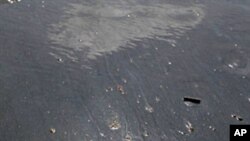U.S. Interior Secretary Ken Salazar says he is continuing to reform his department in the wake of the leaking oil well disaster in the Gulf of Mexico.
Appearing before the U.S. Senate Environment and Natural Resources Committee Tuesday, Salazar said he has been making major changes in the operation of the Minerals Management Service - the agency that regulates off-shore oil exploration.
Salazar also updated the committee on efforts to mitigate the oil spill. He cited oil company BP's report that it is now siphoning about 2,000 barrels of oil a day, compared to 1,000 barrels Monday.
The company is using a nearly two-kilometer-long tube to funnel the captured oil to a tanker ship on the surface. The company has estimated as much as 5,000 barrels are escaping from the damaged well each day, though other experts believe the amount is much higher.
Meanwhile, the U.S. Coast Guard reports tar balls have washed up on the beach in the Florida Keys. They say the tar balls are being examined to determine if they originated from the Gulf of Mexico oil leak.
The well has leaked hundreds of thousands of liters of oil into the Gulf of Mexico since an April 20 explosion on the oil rig killed 11 workers.
Obama administration officials are testifying before Congress for a second straight day on the oil spill.
Homeland Security Secretary Janet Napolitano testified Monday that more than 17,000 personnel at the federal, state and local levels, and thousands of trained volunteers, are working to protect the Gulf shoreline.
The White House also is expected to announce in coming days the creation of a presidential commission to investigate the accident that led to the massive spill.
A White House official, speaking on condition of anonymity, said Monday the panel will be established by executive order.
The official said the commission will be similar to panels created to investigate the 1979 nuclear accident at Three Mile Island plant in Pennsylvania and the 1986 explosion of the space shuttle Challenger.
The official also said no current government employees will serve on the panel.
BP says its next move to contain the spill would involve a procedure known as a "top kill," in which another tube is used to shoot mud into the well to prevent oil and gas from escaping.
Some scientists say they are concerned about the oil reaching a major water stream, known as the loop current that could carry the crude through the Florida Keys and even up the U.S. East Coast.
BP also has been spraying chemical dispersants at the site of the leak, an operation the company says is showing some success.
US Interior Secretary Pledges Continued Reform in Wake of Oil Spill




